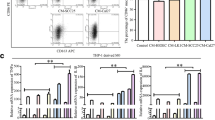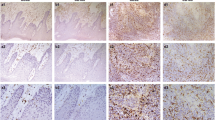Abstract
Background
Recent studies suggest that tumor-associated macrophages (TAMs) promote tumor growth and metastasis. Our previous report demonstrated that Axl signaling promotes carcinogenesis and progression of oral squamous cell carcinoma (OSCC). This study aims to test the potential involvement of growth arrest-specific gene 6 (Gas6)/Axl signaling in the protumoral effect of TAMs.
Methods
Co-culture experiments by incubation of OSCC cells (YD38 and OE) and macrophages (THP-1) were performed. The expression of Gas6/Axl and epithelial-mesenchymal transition (EMT) genes were examined in YD38 and OE cells. The effect of Gas6/Axl signaling on co-cultured cancer cells was further investigated by knocking down Axl expression and neutralizing Gas6. Axl and TAM distribution were analyzed by immunohistochemistry in OSCC tissues.
Results
Activation of Axl signaling and increased expression of mesenchymal markers, along with increased invasion/migration ability of OSCC cells, was noted upon co-culture with THP-1. Neutralization of Gas6 in the co-culture system or knockdown of Axl in YD38 caused the co-culture effects to be diminished. Co-culture with THP-1 increased nuclear factor (NF)-κB nuclear translocation and transcription activity in YD38 cells. A significant association between the TAM count and expression of phosphorylated Axl (P = 0.004) was found in vivo cancer tissues.
Conclusions
TAMs play a protumor role in OSCC and likely promote tumor progression through activation of the Gas6/Axl–NF-κB signaling pathway. Therefore, Gas6/Axl and NF-κB signaling in OSCC cells may be a putative target for therapeutic intervention.




Similar content being viewed by others
References
Schmidt T, Ben-Batalla I, Schultze A, Loges S. Macrophage-tumor crosstalk: role of TAMR tyrosine kinase receptors and of their ligands. Cell Mol Life Sci. 2012;69:1391–414.
Solinas G, Germano G, Mantovani A, Allavena P. Tumor-associated macrophages (TAM) as major players of the cancer-related inflammation. J Leukoc Biol. 2009;86:1065–73.
Shieh YS, Hung YJ, Hsieh CB, Chen JS, Chou KC, Liu SY. Tumor-associated macrophage correlated with angiogenesis and progression of mucoepidermoid carcinoma of salivary glands. Ann Surg Oncol. 2009;16:751–60.
Kang JC, Chen JS, Lee CH, Chang JJ, Shieh YS. Intratumoral macrophage counts correlate with tumor progression in colorectal cancer. J Surg Oncol. 2010;102:242–8.
O’Bryan JP, Frye RA, Cogswell PC, et al. Axl, a transforming gene isolated from primary human myeloid leukemia cells, encodes a novel receptor tyrosine kinase. Mol Cell Biol. 1991;11:5016–31.
Schneider C, King RM, Philipson L. Genes specifically expressed at growth arrest of mammalian cells. Cell. 1988;54:787–93.
Tjwa M, Bellido-Martin L, Lin Y, et al. Gas6 promotes inflammation by enhancing interactions between endothelial cells, platelets, and leukocytes. Blood. 2008;111:4096–105.
Loges S, Schmidt T, Tjwa M, et al. Malignant cells fuel tumor growth by educating infiltrating leukocytes to produce the mitogen Gas6. Blood. 2010;115:2264–73.
Sawabu T, Seno H, Kawashima T, et al. Growth arrest-specific gene 6 and Axl signaling enhances gastric cancer cell survival via Akt pathway. Mol Carcinog. 2007;46:155–64.
Korshunov VA. Axl-dependent signalling: a clinical update. Clin Sci (Lond). 2012;122:361–8.
Sasaki T, Knyazev PG, Clout NJ, et al. Structural basis for Gas6-Axl signalling. EMBO J. 2006;25:80–7.
Lee CH, Yen CY, Liu SY, et al. Axl is a prognostic marker in oral squamous cell carcinoma. Ann Surg Oncol. 2012;19(Suppl 3):500–8.
Lee CH, Hung HW, Hung PH, Shieh YS. Epidermal growth factor receptor regulates beta-catenin location, stability, and transcriptional activity in oral cancer. Mol Cancer. 2010;9:64.
Liu SY, Chang LC, Pan LF, et al. Clinicopathologic significance of tumor cell-lined vessel and microenvironment in oral squamous cell carcinoma. Oral Oncol. 2008;44:277–85.
Huang Y, Snuderl M, Jain RK. Polarization of tumor-associated macrophages: a novel strategy for vascular normalization and antitumor immunity. Cancer Cell. 2011;19:1–2.
Wang HW, Joyce JA. Alternative activation of tumor-associated macrophages by IL-4: priming for protumoral functions. Cell Cycle. 2010;9:4824–35.
Linger RM, Keating AK, Earp HS, Graham DK. Taking aim at Mer and Axl receptor tyrosine kinases as novel therapeutic targets in solid tumors. Expert Opin Ther Targets. 2010;14:1073–90.
Sainaghi PP, Castello L, Bergamasco L, Galletti M, Bellosta P, Avanzi GC. Gas6 induces proliferation in prostate carcinoma cell lines expressing the Axl receptor. J Cell Physiol. 2005;204:36–44.
Hutterer M, Knyazev P, Abate A, et al. Axl and growth arrest-specific gene 6 are frequently overexpressed in human gliomas and predict poor prognosis in patients with glioblastoma multiforme. Clin Cancer Res. 2008;14:130–8.
Fernandez–Fernandez L, Bellido-Martin L, Garcia de Frutos P. Growth arrest-specific gene 6 (GAS6). An outline of its role in haemostasis and inflammation. Thromb Haemost. 2008;100:604–10.
Lafdil F, Chobert MN, Couchie D, Brouillet A, Zafrani ES, Mavier P, Laperche Y. Induction of Gas6 protein in CCl4-induced rat liver injury and anti-apoptotic effect on hepatic stellate cells. Hepatology. 2006;44:228–39.
Demarchi F, Verardo R, Varnum B, Brancolini C, Schneider C. Gas6 anti-apoptotic signaling requires NF-kappa B activation. J Biol Chem. 2001;276:31738–44.
Tai KY, Shieh YS, Lee CS, Shiah SG, Wu CW. Axl promotes cell invasion by inducing MMP-9 activity through activation of NF-kappaB and Brg-1. Oncogene. 2008;27:4044–55.
Shankar SL, O’Guin K, Cammer M, et al. The growth arrest-specific gene product Gas6 promotes the survival of human oligodendrocytes via a phosphatidylinositol 3-kinase-dependent pathway. J Neurosci. 2003;23:4208–18.
Shankar SL, O’Guin K, Kim M, et al. Gas6/Axl signaling activates the phosphatidylinositol 3-kinase/Akt1 survival pathway to protect oligodendrocytes from tumor necrosis factor alpha-induced apoptosis. J Neurosci. 2006;26:5638–48.
Romashkova JA, Makarov SS. NF-kappaB is a target of AKT in anti-apoptotic PDGF signalling. Nature. 1999;401:86–90.
Hagemann T, Wilson J, Kulbe H, et al. Macrophages induce invasiveness of epithelial cancer cells via NF-kappa B and JNK. J Immunol. 2005;175:1197–205.
Acknowledgment
This work was supported by research Grants (No. NSC99-2314B-016-026-MY3, No. CMNDMC10106, No. MAB101-16, and No. TSGH-C101-007-012-S01), Taiwan.
Author information
Authors and Affiliations
Corresponding author
Additional information
Chien-Hsing Lee and Shyun-Yeu Liu have contributed equally to this work.
Rights and permissions
About this article
Cite this article
Lee, CH., Liu, SY., Chou, KC. et al. Tumor-Associated Macrophages Promote Oral Cancer Progression Through Activation of the Axl Signaling Pathway. Ann Surg Oncol 21, 1031–1037 (2014). https://doi.org/10.1245/s10434-013-3400-0
Received:
Published:
Issue Date:
DOI: https://doi.org/10.1245/s10434-013-3400-0




